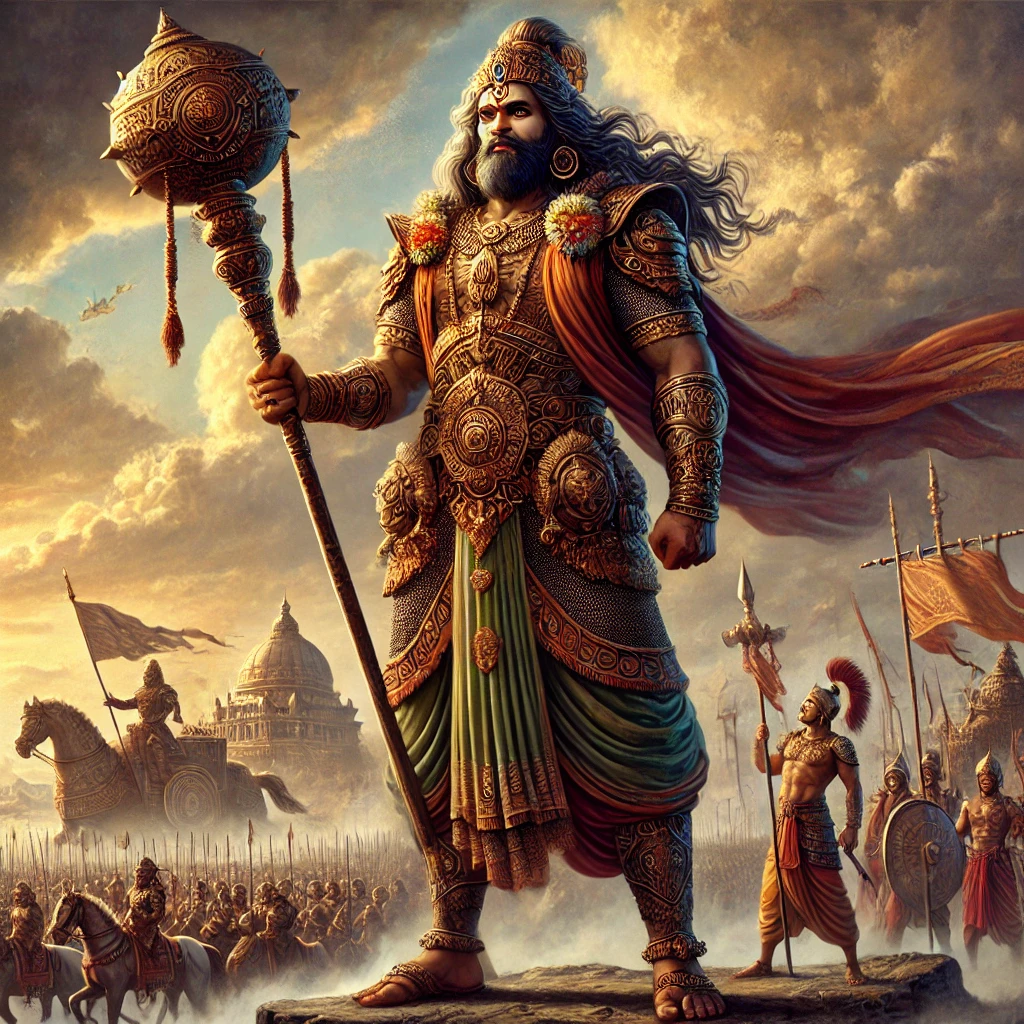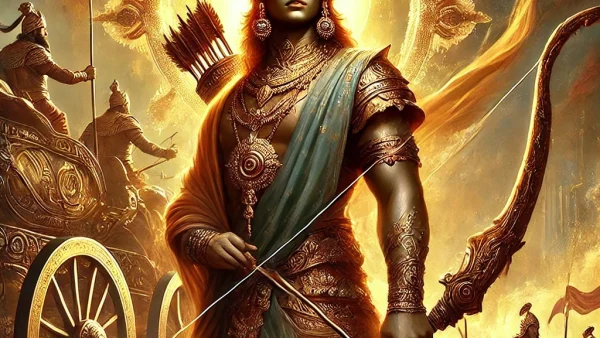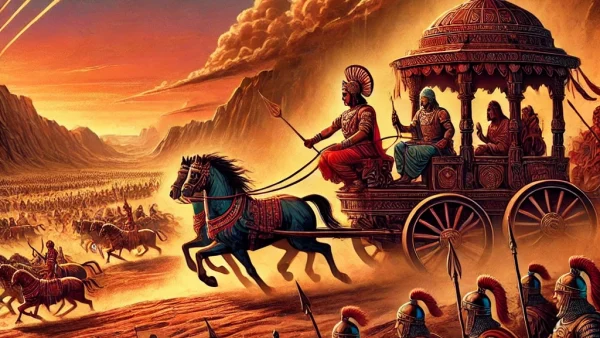The Indian epic Mahabharata is a timeless tale of dharma (righteousness) and adharma (unrighteousness), filled with characters of immense complexity. Among them, Duryodhana, the eldest of the Kauravas, stands out as a pivotal and controversial figure. Often portrayed as the antagonist, Duryodhana’s life is a compelling narrative of ambition, jealousy, loyalty, and tragedy.
The Origins of Duryodhana
Duryodhana, originally named Suyodhana (meaning “good in war”), was the firstborn son of King Dhritarashtra and Queen Gandhari. Despite his noble birth as the prince of Hastinapur, his name later evolved to Duryodhana (“bad in war”), reflecting his controversial deeds and perceived role in the Mahabharata.
Born into the Kuru dynasty, Duryodhana was raised alongside his 99 brothers and one sister, Dushala. His father, Dhritarashtra, though the rightful heir to the throne, was passed over due to his blindness, with the kingdom handed to his younger brother, Pandu. This historical slight sowed seeds of resentment that shaped Duryodhana’s psyche and actions.
Duryodhana’s Rivalry with the Pandavas
Duryodhana’s enmity with the Pandavas, his cousins, is the core of the Mahabharata. When Pandu renounced the throne and moved to the forest, the Pandavas—born through divine intervention to Pandu’s wives—were brought to the palace of Hastinapur by Bhishma, the patriarch of the Kuru dynasty. This decision inadvertently ignited a bitter rivalry.
The Crown Prince Controversy
At the tender age of fifteen, Duryodhana learned that Yudhishthira, the eldest Pandava, would be declared the Crown Prince. This announcement was a shock for Duryodhana, who believed the throne rightfully belonged to him. The Pandavas’ popularity and virtues only added to his frustration, planting deep seeds of jealousy.
Bullying and Humiliation
The tension between the cousins was exacerbated by Bhima, the strongest Pandava, who often bullied Duryodhana and his brothers. This relentless torment and lack of empathy from the elders made Duryodhana an easy pawn in the hands of his manipulative uncle, Shakuni. Shakuni, driven by vengeance against the Kuru dynasty, fueled Duryodhana’s resentment and encouraged his darker impulses.
The Dice Game: A Turning Point
One of the most infamous episodes in the Mahabharata is the dice game orchestrated by Duryodhana and Shakuni. Using deceit and manipulation, they compelled Yudhishthira to gamble away his kingdom, wealth, and even his wife, Draupadi. The humiliation of Draupadi in the Kaurava court marked a significant escalation in the conflict, setting the stage for the epic Kurukshetra War.
This event highlighted Duryodhana’s moral downfall. However, it also exposed Yudhishthira’s weakness in succumbing to gambling, making the story’s moral landscape more complex than a simple tale of good versus evil.
The Kurukshetra War
The Kurukshetra War is the climax of the Mahabharata, where the Kauravas and Pandavas clash on the battlefield. As the leader of the Kaurava army, Duryodhana demonstrated exceptional courage and strategic acumen.
Strengths as a Warrior
Duryodhana was a skilled mace fighter, unmatched except by Bhima. His loyalty to his allies, especially Karna, and his refusal to abandon his friends even in the face of adversity, reflect his noble traits. Unlike many kings of his time, Duryodhana had only one wife, Bhanumati, and treated her with respect, showcasing his monogamous nature.
The Influence of Shakuni
Despite his strengths, Duryodhana’s overreliance on Shakuni’s counsel proved disastrous. Shakuni’s schemes, while initially effective, ultimately led to the downfall of the Kauravas.
The Death of Duryodhana
Duryodhana’s death is one of the most poignant moments in the Mahabharata. After the catastrophic loss of his brothers and allies, Duryodhana retreated to a lake, seeking solace. Bhima eventually challenged him to a duel, and despite his valiant efforts, Duryodhana was defeated when Bhima struck a fatal blow to his thighs, violating the rules of mace combat.
As he lay dying, Duryodhana received solace from Ashwatthama and others, who vowed to avenge his death. His tragic end serves as a reminder of the devastating consequences of unchecked ambition and pride.
Duryodhana: A Complex Character
Duryodhana’s character defies simplistic labels of hero or villain. While his actions often align with adharma, his motivations and circumstances evoke sympathy.
Positive Traits
- Equality and Friendship: Duryodhana’s unwavering friendship with Karna, despite the latter’s lower caste, demonstrates his progressive stance on equality.
- Leadership and Governance: According to the Stree Parva of the Mahabharata, Duryodhana was a capable ruler who was loved by his subjects.
Negative Traits
- Lack of Diplomacy: Duryodhana’s inability to see through Shakuni’s manipulations was a significant flaw.
- Disrespect for Women: His role in Draupadi’s humiliation remains one of his most condemnable acts.
Duryodhana and Krishna: A Tale of Misjudgment
Duryodhana’s disdain for Krishna, whom he viewed as a mere cowherd, blinded him to Krishna’s divine wisdom. This underestimation proved fatal, as Krishna’s strategic brilliance ensured the Pandavas’ victory in the war.
Missteps in Allegiances
During the pre-war negotiations, Duryodhana chose Krishna’s vast army over Krishna himself, dismissing the latter’s importance. In contrast, Arjuna’s decision to align with Krishna underscored the value of wisdom over brute strength.
Legacy of Duryodhana
Duryodhana’s legacy in the Mahabharata is a study in contrasts. He is a tragic hero whose flaws and virtues make him profoundly human. His story serves as a cautionary tale about the perils of ambition, jealousy, and misplaced trust.
Lessons from Duryodhana
- Empathy Matters: A lack of understanding and support during his formative years contributed to Duryodhana’s bitterness. This highlights the importance of empathy in nurturing individuals.
- Beware of Manipulation: Duryodhana’s reliance on Shakuni underscores the dangers of placing blind faith in others.
- Ambition vs. Dharma: His life illustrates the delicate balance between personal ambition and adherence to dharma.
Conclusion
Duryodhana’s character in the Mahabharata embodies the complexities of human nature. While his actions often led to destruction, his motivations and circumstances make him a relatable figure. As readers, we are reminded that the line between heroism and villainy is often blurred, shaped by perspective and context.
To delve deeper into Duryodhana’s story and explore the spiritual significance of the Mahabharata, visit spiritualguru.lk. Uncover a treasure trove of wisdom, spiritual accessories, and insights that bring ancient epics to life.




Pingback: Was the Kurukshetra War Real? - Spiritual Guru